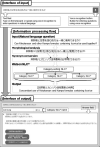Development of a novel drug information provision system for Kampo medicine using natural language processing technology
- PMID: 37442993
- PMCID: PMC10347708
- DOI: 10.1186/s12911-023-02230-3
Development of a novel drug information provision system for Kampo medicine using natural language processing technology
Abstract
Background: Kampo medicine is widely used in Japan; however, most physicians and pharmacists have insufficient knowledge and experience in it. Although a chatbot-style system using machine learning and natural language processing has been used in some clinical settings and proven useful, the system developed specifically for the Japanese language using this method has not been validated by research. The purpose of this study is to develop a novel drug information provision system for Kampo medicines using a natural language classifier® (NLC®) based on IBM Watson.
Methods: The target Kampo formulas were 33 formulas listed in the 17th revision of the Japanese Pharmacopoeia. The information included in the system comes from the package inserts of Kampo medicines, Manuals for Management of Individual Serious Adverse Drug Reactions, and data on off-label usage. The system developed in this study classifies questions about the drug information of Kampo formulas input by natural language into preset questions and outputs preset answers for the questions. The system uses morphological analysis, synonym conversion by thesaurus, and NLC®. We fine-tuned the information registered into NLC® and increased the thesaurus. To validate the system, 900 validation questions were provided by six pharmacists who were classified into high or low levels of knowledge and experience of Kampo medicines and three pharmacy students.
Results: The precision, recall, and F-measure of the system performance were 0.986, 0.915, and 0.949, respectively. The results were stable even with differences in the amount of expertise of the question authors.
Conclusions: We developed a system using natural language classification that can give appropriate answers to most of the validation questions.
Keywords: Chatbots; Conversational agents; Drug information provision system; Kampo medicine; Natural language processing; Question-answering.
© 2023. The Author(s).
Conflict of interest statement
TYo was employed for the joint research program by Tsumura & Co. KW and YH received lecture fees from Tsumura & Co. The other authors declare that the research was conducted in the absence of any commercial or financial relationships that could be construed as a potential conflict of interest.
Figures



Similar articles
-
The Integration of Traditional Medicine with Conventional Biomedicine: A Narrative Review of the Japanese Perspective.J Integr Complement Med. 2023 Jun-Jul;29(6-7):372-379. doi: 10.1089/jicm.2022.0643. Epub 2023 Mar 24. J Integr Complement Med. 2023. PMID: 36961400 Free PMC article. Review.
-
[Standardization of Crude Drugs for the Japanese Pharmacopoeia].Yakugaku Zasshi. 2020;140(6):783-788. doi: 10.1248/yakushi.19-00253-6. Yakugaku Zasshi. 2020. PMID: 32475928 Review. Japanese.
-
[Development of an Informative System for Consumers and Pharmacists Aimed at the Proper Use of Kampo OTCs].Yakugaku Zasshi. 2016;136(2):273-9. doi: 10.1248/yakushi.15-00268-5. Yakugaku Zasshi. 2016. PMID: 26831805 Review. Japanese.
-
Development of Kampo(traditional Japanese medicine)e-learning program: evaluation of the flipped classroom for medical students.Med Educ Online. 2021 Dec;26(1):1938504. doi: 10.1080/10872981.2021.1938504. Med Educ Online. 2021. PMID: 34134610 Free PMC article.
-
Predicting Japanese Kampo formulas by analyzing database of medical records: a preliminary observational study.BMC Med Inform Decis Mak. 2016 Sep 13;16(1):118. doi: 10.1186/s12911-016-0361-9. BMC Med Inform Decis Mak. 2016. PMID: 27619018 Free PMC article.
Cited by
-
Year 2023 in Biomedical Natural Language Processing: a Tribute to Large Language Models and Generative AI.Yearb Med Inform. 2024 Aug;33(1):241-248. doi: 10.1055/s-0044-1800751. Epub 2025 Apr 8. Yearb Med Inform. 2024. PMID: 40199311 Free PMC article.
References
MeSH terms
LinkOut - more resources
Full Text Sources

